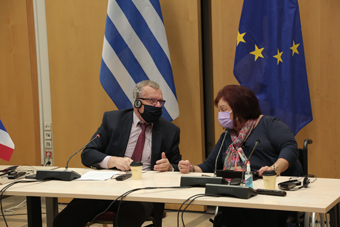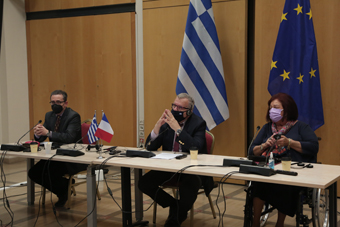Press Office
Athens, 14 April 2021
Greece – France Parliamentary Friendship Groups Conference on occasion of 200th anniversary of Greek Revolution of 1821

On the occasion of the celebration of the 200 years since the Greek Revolution, a Greece-France Parliamentary Friendship Groups Conference was held at the Hellenic Parliament with the relevant friendship group from the French Senate.
The main issues on the agenda of the Conference, which was held in teleconference mode, were philhellenism in 19th century France and the role of France in the war for independence, as well as Greek-French relations in the EU since 1981.
In his opening remarks, the Chairperson of the Greece-France Friendship Group, Mr. Christodoulos Stefanadis, giving a brief historical overview of Greek-French relations, referred to the influence of Greek Antiquity on the Enlightenment, the French contribution to the Greek Revolution, but also the support of France to Greece during the return to Democracy in 1974, emphasising that “throughout time, France has taken a positive stance on important Greek foreign policy issues, and is, therefore, one of the country’s most important allies and partners on the international stage, especially in critical situations, Turkey’s infringing behaviour being the main one”.
Immediately afterwards, the Chairperson of the France-Greece Friendship Group of the French Senate, Mr. Didier Marie, took the floor, and, after first reminding participants that “for two centuries now relations between the two countries have remained close”, said that Greece is the cradle of western civilisation and the root of the Arts and Letters, noting that “Greeks are our brothers and together we claimed liberty”. 
Then, the Director of the Institute of Historical Research (IHR/NHRF), Dr. Georgios Tolias, referred to the concept and the historical dimension of Philhellenism and how it developed in Europe and France, contributing to and shaping the Revolution of 1821. Mr. Tolias explained that Philhellenism was “a collective movement of solidarity”, describing it as an issue “of blood, the blood shed by some thousands of fighters who came to fight on Greek soil”.
The Historian and Lecturer at the Paris 1 Panthéon-Sorbonne University, Mrs. Anne Couderc, also referred to Philhellenism, by making a detailed analysis of the stance and attitude of the French society and government during that historical period.
The Curator of the Parliament’s Art Work Collection, Dr. Theodoros Koutsogiannis focused on French philhellenic art, which, as he said, “established the image of revolutionary Greece more widely in European culture”.
During the second part of the Conference, on the issue of relations between the two countries in the EU since 1981, Mrs. Marietta Giannakou, state MP and Vice-President of the NATO Parliamentary Assembly and member of the European Affairs Committee, took the floor and explained that “the relations between Greece and France have at their indisputable centre European unification”, noting that “the development of events shows that the core of the relations between the two countries remains stronger than any other relationship we forged with big countries”.
For his part, the President of the Board of the Hellenic Foundation for European & Foreign Policy (ELIAMEP) and Professor at the School of International Relations, Sciences Po, in Paris, Mr. Loukas Tsoukalis, stressed that we have much in common with France “and this is something that has been proven time and again”, pointing out that we “do not forget the catalytic role of France in critical phases in our country’s European path”.
The Ambassador of Greece in France, Mrs. Aglaia Balta and the former Ambassador of France in Greece, Mr. Jean-Loup Kuhn-Delforge, also referred to the value and timelessness of cooperation between Greece and France at the political, diplomatic and military level.
Attached you will find the speakers’ interventions (in Greek).
High resolution images

6

7
Related files
Back